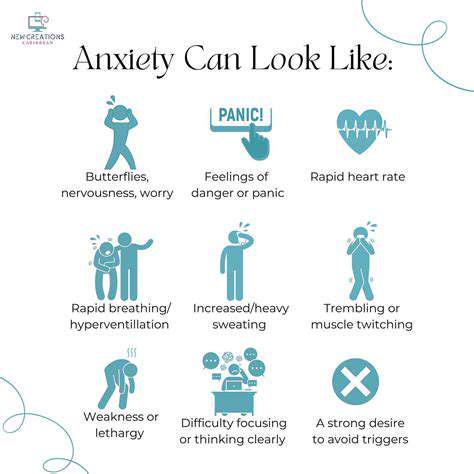청소년의 불안 증상 식별: 부모가 알아야 할 것

Understanding the Underlying Factors
Teenagers are navigating a complex period of physical, emotional, and social development. Hormonal fluctuations play a significant role in mood swings, often leading to heightened emotional responses. This is a time when teens are grappling with identity formation, peer pressure, and the expectations of the world around them. Understanding these factors is crucial in recognizing that these shifts are a natural part of growing up, not necessarily a sign of a deeper problem.
Beyond hormones, environmental stressors like academic pressure, family dynamics, and social anxieties can significantly impact mood. These external pressures often contribute to increased stress and, consequently, more frequent mood swings. Recognizing that these factors are at play can help parents and educators to approach these situations with more empathy and understanding.
Coping Strategies for Teens and Adults
It's essential for teens to develop healthy coping mechanisms to manage these mood swings effectively. Practicing mindfulness and relaxation techniques can help teens regulate their emotions, allowing them to respond to challenging situations with more composure. This might include deep breathing exercises, meditation, or engaging in activities they find calming, such as listening to music, spending time in nature, or pursuing a hobby.
For adults, understanding the developmental stage of adolescence and the associated emotional complexities is key to supportive interactions. Providing a safe and empathetic environment for teens to express their feelings, without judgment, can significantly contribute to their emotional well-being. Encouraging open communication and actively listening to their concerns can help teens feel heard and understood, reducing the potential for further emotional distress.
Seeking Professional Help When Needed
While mood swings are a normal part of adolescence, persistent and severe mood fluctuations can sometimes indicate an underlying issue. If a teen is experiencing extreme emotional distress, impacting their daily life, relationships, or academics, seeking professional help is crucial. A mental health professional can assess the situation, provide guidance, and develop a tailored plan to support the teen's emotional well-being.
It's equally important to be aware of the signs of potential mental health conditions. Sudden shifts in behaviour, loss of interest in activities, withdrawal from social interactions, or significant changes in sleep or appetite could be indicators that require further evaluation. Don't hesitate to reach out to a healthcare provider or mental health specialist if you have concerns about a teen's emotional well-being.
Seeking Professional Help: When to Intervene
Recognizing the Warning Signs
Teens experience a wide range of emotions, and it's normal for them to feel anxious from time to time. However, when anxiety becomes persistent, impacting their daily life, and interfering with their ability to function, it's a crucial sign that professional help might be needed. Recognizing the warning signs is the first step toward providing support and ensuring the teen receives the appropriate care. Look for changes in behavior, like withdrawal from social activities, difficulty concentrating, or a sudden shift in appetite or sleep patterns. These can be subtle or more pronounced, but they often indicate underlying anxiety that needs attention.
Observing changes in mood is also important. Irritability, restlessness, or excessive worry, especially if these persist for weeks or months, can be signs of an anxiety disorder. These indicators, when coupled with other observable behaviors, can help determine whether professional intervention is necessary.
Identifying Persistent Anxiety Symptoms
Persistent anxiety symptoms are a key indicator that professional help is warranted. This isn't about occasional nervousness or worry; it's about symptoms that are ongoing and significantly impacting the teen's life. Physical symptoms, like headaches, stomach aches, or difficulty breathing, can also signal underlying anxiety and should not be dismissed. Pay attention to if these symptoms are linked to specific situations or are present most of the time.
Additionally, consider the intensity and duration of the anxiety. If the anxiety is severe enough to interfere with school, friendships, or other activities, professional help is likely necessary. The duration is also important; if the symptoms have been present for an extended period, it's time to seek professional guidance.
Assessing Impact on Daily Functioning
A crucial aspect of determining when to intervene is assessing how anxiety is impacting the teen's daily functioning. Is it affecting their ability to attend school, maintain friendships, or participate in extracurricular activities? Are they experiencing significant difficulties with sleep, eating, or concentration? These indicators can highlight the severity of the anxiety and the need for professional support.
If the teen's anxiety is severely impacting their ability to engage in everyday tasks and responsibilities, professional help is vital. This isn't just about occasional struggles; it's about a consistent pattern of difficulty that significantly hinders their overall well-being.
Understanding the Role of Social Support
While social support is crucial for teens, it's not always sufficient in managing severe anxiety. If the teen's anxiety is impacting their social interactions, seeking support from friends and family might not be enough. It's important to recognize the limits of social support and when professional intervention is necessary to address the underlying causes of the anxiety.
Considering the Severity of the Anxiety
The severity of the anxiety is a critical factor in determining the need for professional help. If the anxiety is causing significant distress, interfering with daily life, and leading to avoidance behaviors, then professional guidance is likely necessary. Seeking professional help is not a sign of weakness but a proactive step toward ensuring the teen receives the appropriate support and care.
Recognizing the Need for Specialized Care
In some cases, the anxiety may be more complex and require specialized care. If the anxiety is accompanied by other mental health concerns, or if the teen is exhibiting self-harming behaviors or thoughts of suicide, immediate professional help is crucial. Don't hesitate to seek help from a mental health professional if you have serious concerns about the teen's well-being.
Seeking professional help is a sign of strength, not weakness. It demonstrates a commitment to the teen's well-being and provides the best chance for effective intervention and positive outcomes.